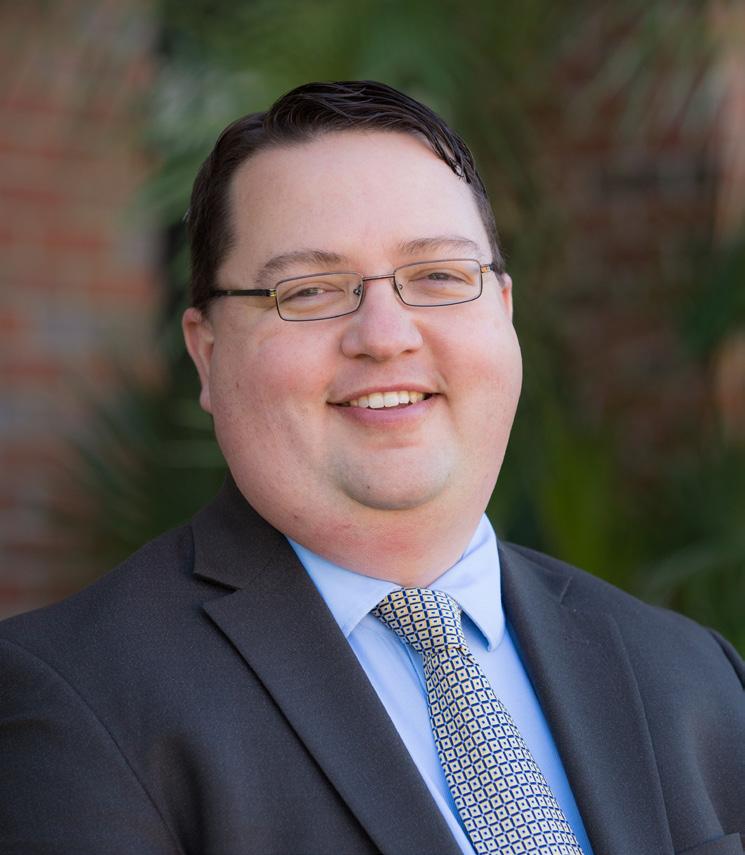
3 minute read
RESEARCH
DEVELOPING NEW MATERIALS FOR MOBILE DEVICES

JENNIFER ANDREW, PH.D., IS ENGINEERING SCALABLE AND HIGHPERFORMANCE MAGNETIC MATERIALS THROUGH A $1.4 MILLION NSF GRANT THAT WILL BE USED IN POWER ADAPTERS.
Three professors from UF’s Herbert Wertheim College of Engineering are developing nanocomposite magnetic materials with high saturation and low loss for miniaturizing power magnetic components.
This research grant will help identify new synthetic and nanomanufacturing processes and harness the beneficial properties of metal- and oxide-based materials. It will optimize the creation of compact power inductors and transformers while still making them compatible with current manufacturing standards.

Jennifer Andrew, Ph.D.
PRINCIPAL INVESTIGATOR Associate Professor


Josephine Allen, Ph.D.
PRINCIPAL INVESTIGATOR Genzyme Associate Professor of Materials Science & Engineering
Out of This World
MSE Professor Dr. Josephine Allen will study the cells back on earth to look for changes as a result of microgravity.
“When astronauts go into space they are experiencing extreme conditions which include magnified levels of radiation compared to earth and anti-gravity that doesn’t exist here,” she said.
The goal of this study is to compare the health of Earth-grown vascular cells with vascular cells that go into space and experience radiation and microgravity environments onboard the international space station.
The cells will be studied on campus in the Allen Lab at UF to look at changes in genomics and transcriptomics, which provides insight into the genes that are actively expressed and change based on external environments, and to gain better insight into the molecular mechanisms behind cardiovascular disease through seeing how these cells restructure themselves.

BUILDING BETTER ENGINES THAT CONSUME LESS ENERGY

MICHAEL TONKS, PH.D. IS USING AN ADVANCED COMPUTER TOOL TO IMPROVE CORROSION RESISTANCE IN ENGINES WITH SUPPORT FROM THE DEPARTMENT OF ENERGY.
Increasing the operating temperatures of gasoline engines increases their efficiency.
However, the higher temperatures accelerate corrosion of engine parts, such as the engine valves, due to the combustion gases inside the engine cylinders.
The goal of this project is to develop an advanced computer tool, the Stainless Steel Alloy Corrosion (SStAC) tool, that predicts the corrosion of valve steels during engine operation. The SStAC tool will include the impact of the steel microstructure on corrosion, and will be developed with new information obtained from advanced experiments and lower length-scale simulations. It will assist in part design, reducing costs by eliminating the need for conservative design and enabling alloy optimization to improve corrosion resistance. Thus, it will help reduce costs for existing engines and will assist in the material and engine design for the engines of the future, reducing the development time by years.

Michael Tonks, Ph.D.
PRINCIPAL INVESTIGATOR Associate Professor

Ph.D. student Charlyne Smith Awarded NSF Graduate Research Fellowship
Nuclear Engineering Ph.D. student Charlyne Smith has been awarded a coveted National Science Foundation Graduate Research Fellowship. She is a 2017 graduate of Coppin State University, where she earned her bachelor’s degree in chemistry and mathematics, and is a first year Ph.D. student in the University of Florida’s Department of Materials Science and Engineering. Charlyne was inspired by her childhood in Jamaica to study nuclear energy.


